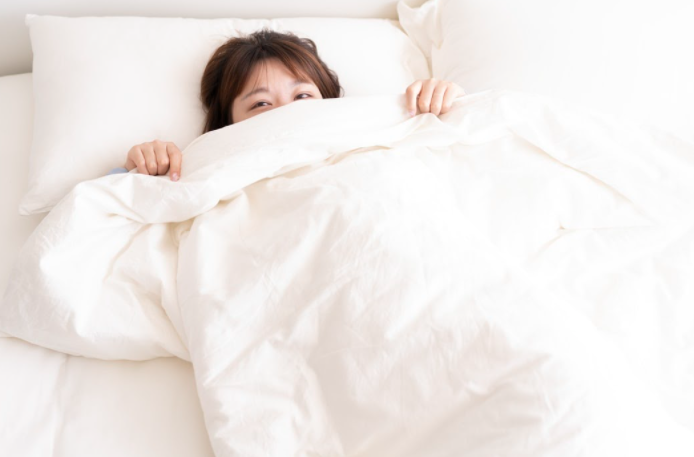7 Tips for Actually Getting a Good Night’s Sleep

Are you having trouble sleeping? Here is how to get a good night’s rest!
A sleepless night can make your next day miserable. After a whole night tossing and turning in bed or waking up all the time, staying focused on work or studies will be challenging. Not to mention that the lack of good rest can cause a host of physical and emotional problems.
How many hours it takes to have a good rest is something that varies from person to person, but everyone requires some quality sleep to face the next day. As sleep quality is determined by several factors that one can control, follow the tips below to help ensure you get enough of it.
1. Give Your Eyes a Rest
We are used to watching TV in the bedroom, reading e-books on tablets, and checking mobile messages just before bedtime. But you need to quit the habit of taking screens to bed at night. When you use electronics screens in bed, you end up overusing your eyes and stimulating your brain. The cause of it all is the artificial lighting of these screens, known as blue light. It interferes with the way the brain regulates your sleep. Believing that it’s already daytime, the brain tells the rest of the body to stay awake, and this affects your sleep cycle.
Medical professionals recommend avoiding overusing these devices just before bed. At the same time, you need to adopt healthy habits to keep your eyesight sharp, especially if you read a lot or watch TV at night. Keep your glasses prescription up to date and browse frames for glasses online to keep your look always in fashion.
2. Take a Natural Sleeping Aid
Sometimes you may need a little help to get the rest you need. But before you jump right into a sleeping pill, try some of these natural sleeping aids:
3. Melatonin
Our body produces this hormone naturally to tell the brain that it’s time to rest. Therefore, melatonin deficiency can impair the quality of your sleep. Supplements of the hormone have become a popular sleeping aid, being used especially to resolve insomnia caused by jet lag after long trips.
4. Magnesium
The substance has been proven to have a relaxing action on the body and brain, which can bring you to sleep faster. Magnesium-rich foods include leafy greens, nuts, seeds like pumpkin and chia, whole grains, and bananas.
5. Lavender
These purple flowers release a fragrance that helps enhance sleep. Just by smelling lavender oil minutes before bedtime, you can help your nervous system relax.
6. Avoid Nicotine
Many smokers believe that cigarettes are relaxing. That’s why they always smoke the last one just before bedtime. But it is just the opposite: like caffeine, nicotine is a stimulant that excites your brain and makes it even harder to fall asleep.
The situation can be even more complex if you don’t smoke but live or work in a smoking environment. Being around smokers or exposed to tobacco smoke can still impact your sleep quality to some degree. Whether you are an active or passive smoker, try to avoid cigarettes at least two hours before bed altogether.
7. Nap Right
There’s nothing wrong with taking a nap after a great lunch or during a long, stressful trip. The quick rest even helps to increase your performance. The problem starts when one nap becomes several. Taking longer ones mid-afternoon or multiple naps throughout the day can compromise your regular sleep at night.
Short naps between 20-30 minutes are ideal for keeping the body rested. But napping too close to bedtime can compromise how much sleep you’ll get afterward. Opt for naps after lunch or in the late afternoon.
8. Alcohol
Consuming alcohol just before bedtime helps some people relax and, because of its sedative properties, makes them fall asleep quicker. But they are the exception rather than the rule: drinking alcohol at night can disrupt normal sleep patterns for most.
Excessive drinking can also mess up all the processes that a good night’s sleep should regulate. When feeling drowsy, symptoms like nausea and vertigo can keep you awake rather than help you sleep.
9. Dedicate the Bedroom To Sleeping
Using the bedroom for more than sleeping can make it challenging to get a restful night. Ideally, you should prepare your bedroom to be an adequate environment for sleep and avoid tasks such as working on your laptop or watching movies in bed.
Proper space decoration can help you receive the call of Morpheus sooner. Avoid bright colors because they can stimulate your brain. Opt for minimalist decor, so you don’t spend the rest of the night examining details and patterns around the bed.
10. Avoid Evening Snacking
Eating late at night (or not eating at all) can greatly compromise your sleep quality. You will spend more time awake in bed, just lying there uncomfortable from being too stuffed or hungry.
Avoid those heavy meals full of carbohydrates or fat at night. When you stuff yourself with fast food or pasta before bed, your digestive system needs to work twice at a time when it naturally should be reducing its activity.
Enough of Counting Sheep in Bed
A good night’s sleep is extremely important for your physical and mental health and improving your quality of life. On the other hand, a poor night’s sleep has side effects such as bad mood, difficulty concentrating, physical and mental fatigue, stress, among others.
You can adopt the tips above to sleep better and ensure your body and brain function better the next day. But if none of them works, the best solution is to seek out a doctor or sleep specialist right away.









